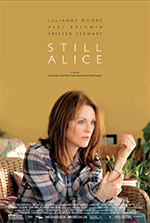
Mastering the Art of Losing
"I’ve always been so defined by my intellect,
my language, my articulation . . ."
Still Alice (2014)
Points
for Reflection
Richard Glatzer’s and Wash Westmoreland’s Still Alice (2014)
- Is it easy to track how much time elapses between consecutive scenes?
- What are the earliest signs that Alice has begun to experience memory lapses, and how effectively does she move through these early incidents?
- What sorts of self-care does Alice regularly perform, and does she maintain these as her mind deteriorates?
- What camera tricks do the filmmakers use to capture Alice’s moments of disorientation?
- What stylistic choices do the directors make when capturing Alice’s testing sessions with the neurologist, and how does this shape our understanding of what’s happening?
- Can Alice’s sense of identity flex to accommodate significant changes to her functioning?
- How do Alice’s cognitive challenges impact her marriage?
- How do Alice’s issues impact relationships with each of her children?
- In what parts of the house in New York City do Alice’s challenges prove most difficult, and in what locations do her difficulties prove inconsequential?
- How does Alice’s eventual diagnosis impact family dynamics?
- Does Alice attempt to hide her problems from others?
- How much can technology assist Alice as her powers of memory weaken?
- How do the filmmakers manipulate camera focus to convey Alice’s difference?
- Why does Alice begin to wear a butterfly necklace given her by the mother who died when Alice was very young?
- Does the family’s beach house provide solace lacking in the city?
- Do Alice’s cognitive challenges effect long-term memories as much as short-term memories?
- Does Alice weaponize her disability at any point?
- How does the Chekhov play in which Lydia performs tackle themes present in the rest of the film?
- Is Alice’s presence at the play a blessing for Lydia?
- Why does this disease hit Alice so hard and fast?
- Which skills does Alice hold onto most tenaciously, and which fade most quickly?
- How does Alice’s preparation for a speech at the Alzheimer’s Association meeting differ from speech prep at the beginning of the movie?
- Which family member accompanies Alice to the Alzheimer’s Association meeting, and how does this individual react to her presentation?
- Which memories does Alice identify as most important to her?
- Is Alice still able to enjoy life once her disease has progressed enough to eliminate her job?
- How does Alice respond to her husband’s new job opportunity?
- Why does Alice’s misplacing her phone so unsettle her?
- Does Alice’s family become increasingly comfortable talking about hard issues around her, or less comfortable?
- What skill does Alice demonstrate at the hospital?
- What does Alice do when she happens upon the video she created for herself earlier?
- Why does John call Lydia a “better man” than himself?
- Is Alice able to track the poetic lines Lydia shares with her at the end of the film?

Richard Glatzer’s and Wash Westmoreland’s Still Alice (2014)
one poster from original film release
Dr. Paul Marchbanks
pmarchba@calpoly.edu
![]()
